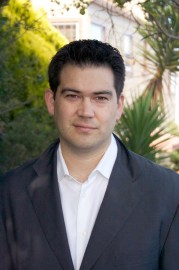Q&As with the Board candidates: Nate Cruz
Why do you wanna be a trustee right now in the middle of this accreditation crisis?
Specifically because of the accreditation crisis, actually. I hadn’t really considered running for this or any office before, this is my first stab at it. I went to community college back in the East Bay and it helped tremendously.
I really think it’s an undervalued asset here in the city.
It’s really important for folks who don’t have financial resources or have the academic history to go into a four-year school, or people who just want vocational training or just want to work on their GED or ESL. I think it’s a very important function in the city and so I think I could just lend a hand with the accreditation crisis, pretty much pointing towards financial problems.
Diablo Valley College, which also had its own problems with accreditation.
This is my backyard. I live back here in Sunnyside and I can see it from my kids window. This is the community college I care to work in.
Well, my wife’s from Baltimore, that’s why I spent some time back there.
No, actually we met in the Peace Corps. We served in Morocco together for a little under two years.
I was an economic development volunteer there. I worked specifically with a cooperative of metal workers. So I helped them get a little more organized and market more to tourists.
It’s like getting a MBA for people who don’t want to go into business. It’s a lot of quantitative analysis, a cost benefit analysis of different government programs, how much they cost and trying to identify different revenue strategies for funding things that often don’t come with their own funding source.
The thing that I haven’t seen, and I’m not privy to what might be going on at a staff level that doesn’t make the paper or public documents, is the strategy for how they’re going to help align the services with the money that they have.
I was a little alarmed to see that story about closing two of the instructional sites and closing down an administrative office, because it wasn’t discussed as a much larger plan here.
I think that the worst thing that we could do as an institution is, “oh, that will save us money and that will save us money” and they’re making all these independent decisions without a cohesive approach to looking at everything.
What we want to do is look at all the services we provide and first look at what covers its own costs, if anything. After that, look at stuff that is critical to the mission: transferring student courses or GED or ESL, it’s what we’re here to do. So you have to prioritize things and see what you can get with the money you have.
But I think that sort of overall strategy is something I haven’t seen yet, that I’m a little worried is missing.
For anything. I was senior class president. The last time I ran for something was a little while ago.
I did!
I think that the ultimate democracy lies with the trustees. So I think whatever failures there are in the institution, ultimately they are the most responsible people. It’s a really daunting institution to try to manage.
There’s not always a clear, central strategy or theme coming down for the whole institution to how each campus might fit into the overall scheme of things, and I think that’s necessary. Especially right now, I think it needs a strong central leadership group to steer it from this morass that it’s in.
Clearer democracy would be ideal.
No, no, not particularly. It’s an important institution, I recognize that, I want to contribute to that. I work for the board of supervisors as a financial analyst and we touch a lot of people.
A $24 million hole in the budget. So if those don’t pass, then more of the horrible waves of cuts that have already been seen will actually occur.
The short term answer is cuts, service cuts. The medium- and long-term answer includes trying to identify new sources of revenue. But even if we could come up with as many ideas as we want, very few of those ideas could fill a budget hole in the immediate budget year.
I think most people that are on the board today and everyone that I’ve talked to that’s running, are really interested in trying to keep City College as a place for the whole community, and expanding services wherever is possible, which means maintaining what we have. I think you have to cut what you have to, but try to identify new revenue sources.
I was listening to a podcast called The Bugle on the way here. It’s a comedy thing with John Oliver from the Daily Show (with Jon Stewart). And I listen to a lot of This American Life talk radio.
No, I don’t. I was born on December 31st. Capricorn! It’s obviously a priority, I read my horoscope every day.
This is my first encounter with The Guardsman, actually.
Follow Winkles on Twitter: @emmawinkles

